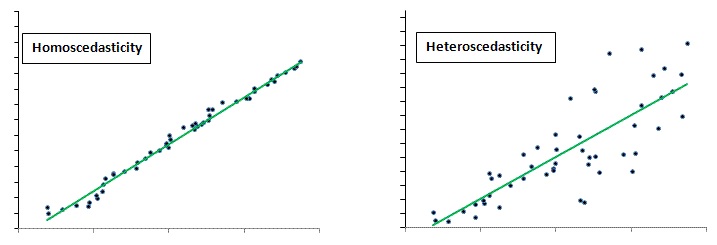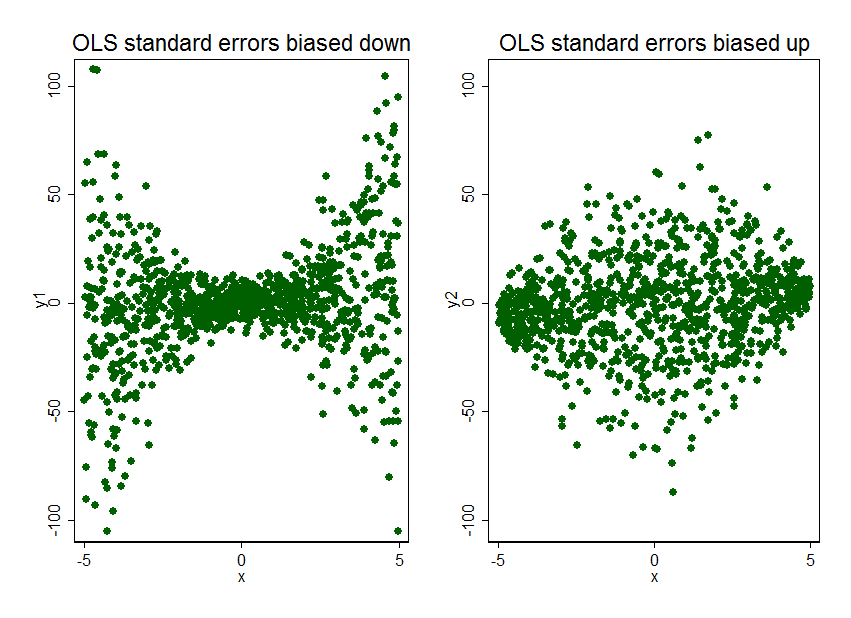class: center, middle, inverse, title-slide # Week 13 - Uncertainty ## OLS Assumptions, Robust Standard Errors, Logit <html> <div style="float:left"> </div> <hr color='#EB811B' size=1px width=800px> </html> ### Danilo Freire ### 24 April 2019 --- <style> .remark-slide-number { position: inherit; } .remark-slide-number .progress-bar-container { position: absolute; bottom: 0; height: 6px; display: block; left: 0; right: 0; } .remark-slide-number .progress-bar { height: 100%; background-color: #EB811B; } .orange { color: #EB811B; } </style> # Today's Agenda .font150[ * Regression with uncertainty * Assumptions: exogeneity and homoscedasticity * Robust standard errors * `estimatr` package * Logistic regression ] --- # Model Assumptions .center[] --- # Model Assumptions .center[] --- # Regression with Uncertainty .font150[ * Recall the model: `$$y_i \ = \ \beta_0 + \beta_1 x_i + \epsilon_i,$$` * where `\(\mathbb{E}(\epsilon_i) = 0\)` and `\(\mathbb{V}(\epsilon_i)=\sigma^2\)` * Estimation of parameters via .orange[least squares:] `$$\textsf{minimize SSR} \quad \textsf{where} \quad \textsf{SSR} \ = \ \sum_{i=1}^n \hat\epsilon_i^2 \ =$$` `$$\sum_{i=1}^n (y_i - \hat\beta_0 - \hat\beta_1 x_i)^2$$` ] --- # Exogeneity and Homoskedasticity .font150[ * Key Assumptions: - .orange[Exogeneity:] the mean of `\(\epsilon_i\)` does not depend on `\(x_i\)` `$$\mathbb{E}(\epsilon_i \mid x_i) \ = \ \mathbb{E}(\epsilon_i) \ = \ 0$$` - .orange[Homoscedasticity:] the variance of `\(\epsilon_i\)` does not depend on `\(x_i\)` `$$\mathbb{V}(\epsilon_i \mid x_i) \ = \ \mathbb{V}(\epsilon_i) \ = \ \sigma^2$$` ] -- .font150[ * When is each assumption violated? * What to do in those cases? ] --- # Exogeneity .font150[ * Exogeneity means that the unobserved causes of the dependent variable are _uncorrelated_ with the variables we include in our model * This is a _very strong assumption_ in observational studies * Why? Because of _omitted variable bias_ * .orange[Omitted variable bias:] when there is another factor that causes the independent variables, but we didn't include them in our model - We didn't think of it - Hard to measure ] --- # Omitted Variable Bias .font150[ * A type of bias when we don't include the right control variables * If an important variable is missing, the coefficients will be incorrect * The independent variables we have can either become statistically significant or not, negative or positive, we cannot know for sure * Difficult to verify in observational studies ] --- # Omitted Variable Bias .center[] --- # Omitted Variable Bias .center[] --- # Omitted Variable Bias .center[] --- # Omitted Variable Bias .center[] --- # Exogeneity .font150[ * What to do in those cases? * Very little in terms of statistical analysis * The best solution is to run _a randomised experiment_, whenever feasible * Why? ] -- .font150[ * If the treatment is allocated at random we know it is not correlated with _anything_ * So there is lower risk of omitted variable bias ] --- # Homoscedasticity .font150[ * Homoscedasticity means that the value of standard errors are constant along all values of our independent variables * _This is often not the case either_ * But there is an easy statistical fix for the problem: .orange[robust standard errors] * Robust standard errors are usually (but not always) larger than regular standard errors * So they are _more conservative_: it is more difficult for a result to be statistically significant ] --- # Homoscedasticity .center[] --- # Homoscedasticity .center[] --- # Robust Standard Errors .font150[ * Heteroscedasticity can happen in both experimental and observational studies * `R` has many packages that compute robust standard errors * New, easy to use package: `estimatr` * `lm_robust(Y ~ X, data = your_data)` ] --- # Robust Standard Errors .font100[ ```r mortality <- read.csv("https://raw.githubusercontent.com/pols1600/pols1600.github.io/master/datasets/prediction/bivariate_data.csv") summary(lm(Child.Mortality ~ log(GDP) + PolityIV, mortality)) ``` ``` ## ## Call: ## lm(formula = Child.Mortality ~ log(GDP) + PolityIV, data = mortality) ## ## Residuals: ## Min 1Q Median 3Q Max ## -142.891 -30.449 -3.328 21.529 212.403 ## ## Coefficients: ## Estimate Std. Error t value Pr(>|t|) ## (Intercept) 424.33897 4.45762 95.19 <2e-16 *** ## log(GDP) -39.92202 0.51740 -77.16 <2e-16 *** ## PolityIV -2.30666 0.08396 -27.47 <2e-16 *** ## --- ## Signif. codes: 0 '***' 0.001 '**' 0.01 '*' 0.05 '.' 0.1 ' ' 1 ## ## Residual standard error: 46.55 on 6187 degrees of freedom ## (24422 observations deleted due to missingness) ## Multiple R-squared: 0.615, Adjusted R-squared: 0.6148 ## F-statistic: 4941 on 2 and 6187 DF, p-value: < 2.2e-16 ``` ] --- # Robust Standard Errors .font100[ ```r library(estimatr) summary(lm_robust(Child.Mortality ~ log(GDP) + PolityIV, mortality)) ``` ``` ## ## Call: ## lm_robust(formula = Child.Mortality ~ log(GDP) + PolityIV, data = mortality) ## ## Standard error type: HC2 ## ## Coefficients: ## Estimate Std. Error t value Pr(>|t|) CI Lower CI Upper DF ## (Intercept) 424.339 5.07487 83.62 0.000e+00 414.390 434.287 6187 ## log(GDP) -39.922 0.56688 -70.42 0.000e+00 -41.033 -38.811 6187 ## PolityIV -2.307 0.08902 -25.91 1.274e-140 -2.481 -2.132 6187 ## ## Multiple R-squared: 0.615 , Adjusted R-squared: 0.6148 ## F-statistic: 4335 on 2 and 6187 DF, p-value: < 2.2e-16 ``` ] --- # Clustered Standard Errors .font150[ * Clustered standard errors are a special kind of robust standard errors * They account for heteroskedasticity across "clusters" of observations (such as states, schools, or individuals) * Used when the data consist of repeated observations of the same units over time - E.g.: 10 countries from 1970 to 1980 * Clustered standard errors are also easily estimated with `estimatr` ] --- # Clustered Standard Errors .font100[ ```r library(estimatr) summary(lm_robust(Child.Mortality ~ log(GDP) + PolityIV, clusters = Country.code, mortality)) ``` ``` ## ## Call: ## lm_robust(formula = Child.Mortality ~ log(GDP) + PolityIV, data = mortality, ## clusters = Country.code) ## ## Standard error type: CR2 ## ## Coefficients: ## Estimate Std. Error t value Pr(>|t|) CI Lower CI Upper DF ## (Intercept) 424.339 22.2811 19.045 1.784e-26 379.73 468.950 57.36 ## log(GDP) -39.922 2.4400 -16.361 2.780e-22 -44.82 -35.027 52.60 ## PolityIV -2.307 0.3382 -6.821 1.885e-09 -2.98 -1.633 76.18 ## ## Multiple R-squared: 0.615 , Adjusted R-squared: 0.6148 ## F-statistic: 191.9 on 2 and 153 DF, p-value: < 2.2e-16 ``` ] --- # Suggestions .font150[ * Always use robust standard errors * They correct for heteroscedasticity when necessary, but do nothing when standard errors are homoscedastic * .orange[They do not change the value of the coefficients], so your effect size is the same * No need to do any additional calculations, just use the `lm_robust()` function from `estimatr` * If you have panel data (repeated observations from the same units over time), use clustered standard errors ] --- # Logistic Regression .font130[ * Many dependent variables follow a binomial distribution (0 or 1) * E.g.: vote (yes or no), pass/fail, win/lose, alive/dead, healthy/sick * It is possible to estimate a linear model with a binary dependent variable * However, it is very likely that the homoscedasticity assumption is violated * Two solutions: - Robust/Clustered standard errors - _Logistic regression_ ] --- # Logistic Regression .font150[ * Logistic regression transforms the linear model so that the values are restricted to 0 or 1 * Linear model: `\(Y = \beta_0 + \beta_1 x_1 + ...+ \epsilon\)` * Logistic regression: `\(Y = \frac{1}{1 + exp^{- (\beta_0 + \beta_1 x_1 + ...+ \epsilon)}}\)` * Good for modelling probabilities * In R: `glm(Y ~ X1 + X2, binomial("logit"), yourdata)` * Somewhat tricky to interpret ] --- # Logistic Regression .center[] --- # Logistic Regression .font100[ ```r # download and open a zipped .dta file from a URL temp <- tempfile() # create temporary file download.file("https://web.stanford.edu/group/ethnic/publicdata/repdata.zip", temp) library(haven) # read Stata .dta civilwars <- read_dta(unz(temp, "repdata.dta")) # load dta unlink(temp) # delete temporary file names(civilwars) ``` ``` ## [1] "ccode" "country" "cname" "cmark" "year" ## [6] "wars" "war" "warl" "onset" "ethonset" ## [11] "durest" "aim" "casename" "ended" "ethwar" ## [16] "waryrs" "pop" "lpop" "polity2" "gdpen" ## [21] "gdptype" "gdpenl" "lgdpenl1" "lpopl1" "region" ## [26] "western" "eeurop" "lamerica" "ssafrica" "asia" ## [31] "nafrme" "colbrit" "colfra" "mtnest" "lmtnest" ## [36] "elevdiff" "Oil" "ncontig" "ethfrac" "ef" ## [41] "plural" "second" "numlang" "relfrac" "plurrel" ## [46] "minrelpc" "muslim" "nwstate" "polity2l" "instab" ## [51] "anocl" "deml" "empethfrac" "empwarl" "emponset" ## [56] "empgdpenl" "emplpopl" "emplmtnest" "empncontig" "empolity2l" ## [61] "sdwars" "sdonset" "colwars" "colonset" "cowwars" ## [66] "cowonset" "cowwarl" "sdwarl" "colwarl" ``` ] --- # Logistic Regression .font100[ ```r civilwars$ethonset <- ifelse(civilwars$ethonset >= 1, 1, civilwars$ethonset) summary(glm(ethonset ~ lgdpenl1 + polity2l, binomial("logit"), civilwars)) ``` ``` ## ## Call: ## glm(formula = ethonset ~ lgdpenl1 + polity2l, family = binomial("logit"), ## data = civilwars) ## ## Deviance Residuals: ## Min 1Q Median 3Q Max ## -0.5119 -0.1734 -0.1337 -0.0992 3.3698 ## ## Coefficients: ## Estimate Std. Error z value Pr(>|z|) ## (Intercept) 1.17383 0.93400 1.257 0.209 ## lgdpenl1 -0.76896 0.13131 -5.856 4.74e-09 *** ## polity2l 0.02720 0.01917 1.419 0.156 ## --- ## Signif. codes: 0 '***' 0.001 '**' 0.01 '*' 0.05 '.' 0.1 ' ' 1 ## ## (Dispersion parameter for binomial family taken to be 1) ## ## Null deviance: 787.71 on 6326 degrees of freedom ## Residual deviance: 750.95 on 6324 degrees of freedom ## (283 observations deleted due to missingness) ## AIC: 756.95 ## ## Number of Fisher Scoring iterations: 8 ``` ] --- # Linear model - Robust SEs .font100[ ```r summary(lm_robust(ethonset ~ lgdpenl1 + polity2l, civilwars)) ``` ``` ## ## Call: ## lm_robust(formula = ethonset ~ lgdpenl1 + polity2l, data = civilwars) ## ## Standard error type: HC2 ## ## Coefficients: ## Estimate Std. Error t value Pr(>|t|) CI Lower CI Upper ## (Intercept) 0.0754590 0.0134397 5.615 2.053e-08 4.911e-02 0.1018053 ## lgdpenl1 -0.0083556 0.0016424 -5.087 3.735e-07 -1.158e-02 -0.0051359 ## polity2l 0.0003086 0.0001861 1.658 9.735e-02 -5.625e-05 0.0006734 ## DF ## (Intercept) 6324 ## lgdpenl1 6324 ## polity2l 6324 ## ## Multiple R-squared: 0.005672 , Adjusted R-squared: 0.005358 ## F-statistic: 14.86 on 2 and 6324 DF, p-value: 3.656e-07 ``` ] --- # Linear model - Clustered SEs .font100[ ```r summary(lm_robust(ethonset ~ lgdpenl1 + polity2l, cluster = country, civilwars)) ``` ``` ## ## Call: ## lm_robust(formula = ethonset ~ lgdpenl1 + polity2l, data = civilwars, ## clusters = country) ## ## Standard error type: CR2 ## ## Coefficients: ## Estimate Std. Error t value Pr(>|t|) CI Lower CI Upper ## (Intercept) 0.0754590 0.0173372 4.352 4.626e-05 4.086e-02 0.1100535 ## lgdpenl1 -0.0083556 0.0020983 -3.982 1.725e-04 -1.254e-02 -0.0041664 ## polity2l 0.0003086 0.0001881 1.640 1.045e-01 -6.526e-05 0.0006824 ## DF ## (Intercept) 68.14 ## lgdpenl1 66.17 ## polity2l 89.02 ## ## Multiple R-squared: 0.005672 , Adjusted R-squared: 0.005358 ## F-statistic: 8.35 on 2 and 155 DF, p-value: 0.0003597 ``` ] --- # Logistic or Linear Regression? .font150[ * If you run a linear model with robust standard errors, the results are similar to those from the logistic regression * Varies according to the discipline: - In statistics and political science, researchers prefer logistic regressions - In economics, they use linear models * If you're writing an article, use both and check if your results are consistent ] --- class: inverse, center, middle # Questions? <html><div style='float:left'></div><hr color='#EB811B' size=1px width=720px></html> --- class: inverse, center, middle # See you on Friday! <html><div style='float:left'></div><hr color='#EB811B' size=1px width=720px></html>